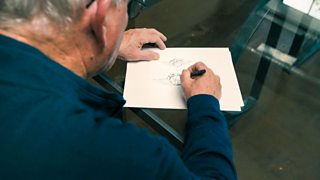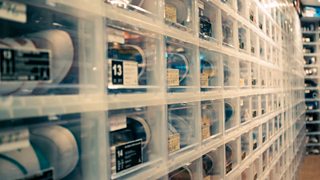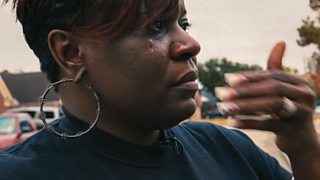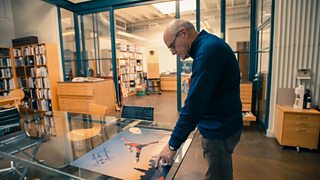Q&A with Director Yemi Bamiro

I've always been interested in sneaker culture
What drove you to tell this story?
I was drawn to this story because of the fact that when I started thinking about ideas for feature length documentaries, I knew that they had to be ideas that I naturally had an interest in, and they had to be ideas that I could live with for a long time because I knew that we would be making this film independently and so, it was going to take a long time to make. It had to be something that I was completely invested in, and I've always been interested in sneaker culture. I've always been interested in the phenomenon of sneaker culture, but specifically Air Jordan collectors and their loyalty and their enthusiasm for this one brand. That was going to be my initial focus of the film, but I changed course quite quickly.
Taking seven years to produce, did you find that helped in the end as you had an initial idea, and then changed course?
The Air Jordan collector idea only lasted about 9 to 12 months, because even when I had the idea, I don't think I was 100% convinced in my head that it could work over feature length duration. I knew that it was interesting, and some of the collectors that I shot with ended up in the in the film, so I knew that it would be worth it. But in terms of affecting the change of trajectory, it didn't really, because I think that the Jordan collectors were still part of the puzzle.
After the initial 9 to 12 months of navigating that in my head, and filming them and knowing that perhaps we needed more, it was pretty clear cut. The story was this big thing about the phenomenon of Air Jordan and what that did to pop culture. And, that was really consistent throughout the six years that it took to get the film finished.
Were there a lot of people you had in mind to interview for this project?
No, this was a bare bones sort of production, an independent film. So we didn't really have the luxury of interviewing lots and lots of people and then not using them in the film. The only other person that we really wanted to film was Spike Lee and we did try really hard to get him. We tried really hard for a number of years. I put together a wish list of people that I really wanted, and all of these people are in the film apart from Spike, but his presence is felt. And I think with hindsight, I don't necessarily feel that he is missing as he has such a huge presence in in the film as it is.
Given the opportunity to interview Michael Jordan or Phil Knight, would you have taken it?

It just doesn't sit well with me
No, I actually never entertained that.
There were a few people that were integral to the story that we would have found it really difficult to tell the story without. Without Sonny Vaccaro, Peter Moore, I think they were the people that were the architects of all of this. And I think David Falk was one of those guys too, and David Stern. It would have been hard to tell the story without him and the others because all of their stories and their contributions to this phenomenon are all interlinked.
What impact did the contributors have on you?
I don't get star struck at all, but I think when we were with David Stern and David Falk, I was. Because they're both giants in terms of their contribution and what they've achieved over their life in terms of their impact not just on basketball, but in a way, pop culture and sports. They were so important and integral; you could argue that without them, it wouldn't have played out in the way that eventually did. And that's why I refer to them as architects. They are going to be the people that laid the groundwork for this all to happen in the way that it did.
A great inclusion was also sneaker writer Russ Bengtson.
I interviewed Russ three times over the course of the seven years. We wanted to get the original power players, the guys that were in the room. And we also had this rule that anybody who wasn't in the room has to have the authority to speak on this subject matter. His career is a testament to that.
You called the film ‘A parable of America's love affair with consumer capitalism and celebrity culture.’ and at the beginning you connect the dots between the consumerism and the supply and demand of the sneakers.
Do you think brands have a responsibility to the consumers when it comes to marketing products?
I think that if you build your brand off the back of the African American community and you use African American athletes to sell to the African American community, then when things happen in the African American community to do with that product, you sort of have a responsibility to speak up, because you've built your whole business off the back of black people. I do think that they have a responsibility in that sense. And no one's asking them to march or anything like that, but having spoken to a lot of parents who lost children over Air Jordans, I think all they ever wanted was acknowledgement - and I don't think they ever got it.
I mean, for a brand to just to come out and condemn it, I think that's all the parents ever wanted, and unfortunately, they never got it. So yes, I do think there's a responsibility. I don't think you can ethically sell to the African American community, the black community, and then when things happen that are quite specific to that community, you don't say anything. It just doesn't sit well with me.
In your research for the film was there a standout moment that you realised that there was that darker side to sneaker culture?

She's an incredible woman; very brave and very strong
No, because I'd always known that this happened. I'd always known that the violence existed. I think maybe subconsciously I didn't know what to do with that information, which is why I thought initially we’d make this a film about Jordan collectors; but I always knew because I grew up a massive hip hop fan and rappers used to talk about people getting jacked on the subway for their Air Jordans. And so yes, I was always aware. I think when I first heard about Dazie’s story, and I realized that the trial for her son's killers hadn't happened; I knew that that was quite important for the story.
In terms of the actual violence and the murders over sneakers, that was a consistent thing that we always knew, once we've got over the ‘This film's not just going to be about Air Jordan collectors’ - once we got over that hump, we knew that we were going to explore the senseless violence that has surrounded the releases of this shoe since the 80s.
It just felt like a responsibility. It felt like it would have been weird to make a film about this subject and not include that, because the thing that I found is that people have always been aware that it happened, they just didn't know that it was still happening. So yes, I think that was the thing that kind of shocked me a little bit because you'd speak to people and they'd say ‘What? That still happens?!’?
And on that subject, you were able to interview Dazie Williams, the mother of Joshua Woods, after he had been shot and killed over his Air Jordans. How did you find that?
I found out about Dazie’s story in the paper here in the UK. And normally when there is violence or even murders over Air Jordans, it makes local news, but her son's case made national news and then it made international news. I met Daisy in 2014 and she was very vocal about raising awareness about this issue. She wanted to campaign. She had a charity called ‘Life Over Fashion’ and the whole point of that charity was to raise awareness of young kids getting killed for Air Jordan sneakers. So in terms of her willingness to talk, she was already talking a lot about this issue.
I think we must have spoken from a couple of months before I ended up going out to Houston to start filming her and the first time that I did fly out to Houston, I wasn't meant to film her, but I did take a camera just in case she had a change of heart. We ended up talking for hours and the first place she took me was the scene where Joshua was gunned down outside a house in a residential street in Houston. I ended up filming with her over the course of three years after that. Just going back and forth to Houston and filming with her. She's an incredible woman; very brave and very strong. I have no idea what it's like to lose a child in that way.
I think people hear about violence over sneakers. They hear about people being shot, but I think it was important for us to actually show the reality of it.
Is there a key takeaway that you want people to have once they've watched the film.
I don't necessarily feel that I want anyone to take anything away from the film. I think it felt like our responsibility to just present all the facts. Here's this sneaker. This is the phenomenon of this sneaker. Here are all of the people that were involved in making this this sneaker a phenomenon. And it's completely up to the viewers’ discretion to make their mind up about what they think about it. It was something we felt really strongly about; we didn't really want to push an agenda of any sort, we just wanted to make a film about a subject that we all found really interesting. It all comes back to the idea that one thing can't be everything. This film just has to be about Air Jordans and the legacy of the brand.

